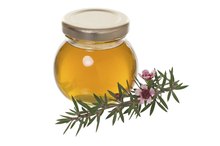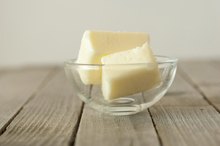Nutrition of Creamed Honey
Creamed honey, also known as whipped honey, is processed to prevent excessive crystallization. An additional benefit of this processing is that creamed honey also has a consistency more conducive to spreading than regular honey. As with regular honey, creamed honey is calorie-dense and high in carbohydrates.
Calories
Creamed honey is a calorie-dense food, and each tablespoon contains 60 calories. That amounts to just 3 percent of the daily suggested intake of 2,000, but is more than an entire cup of strawberries, which contains 45 calories. Eating foods that have small serving sizes but high calorie contents can make it difficult to manage your weight.
Carbohydrates
Manuka Honey Side Effects
Learn More
All of the calories in creamed honey come from carbohydrates. Each tablespoon of creamed honey contains 17 grams of carbohydrates, which makes this food inappropriate for low-carbohydrate diets. Carbohydrates act as your body's primary source of energy.
Sugar
Most of the carbohydrates in creamed honey are sugars. Each tablespoon contains 16 grams of sugar. Consuming a sugar-rich diet can be detrimental because the nutrient can encourage tooth decay. Additionally, research published in the April 2010 edition of The Journal of the American Medical Association notes that high-sugar diets are also related to increased cholesterol levels.
- Most of the carbohydrates in creamed honey are sugars.
- Additionally, research published in the April 2010 edition of The Journal of the American Medical Association notes that high-sugar diets are also related to increased cholesterol levels.
Protein
What Happens to Sugar Levels in the Blood While Fasting?
Learn More
Creamed honey does not contain any protein. This nutrient is required for optimal health, because it contains the amino acids your body needs to produce and repair muscles and other bodily tissues. The Institute of Medicine recommends a daily intake of .8 grams of protein for each kilogram of your bodyweight.
Fat
Creamed honey lacks fat, another vital nutrient for optimal health. Dietary fat is high in calories, but it helps your body absorb vitamins and help maintain healthy tissues, ranging from your skin to your nerves.
Related Articles
References
- MyFitnessPal: Calories in Cox's Creamed Honey
- The Journal of the American Medical Association: Caloric Sweetener Consumption and Dyslipidemia Among US Adults
- National Academy of Sciences: Dietary Reference Intakes for Energy, Carbohydrate, Fiber, Fat, Fatty Acids, Cholesterol, Protein, and Amino Acids (Macronutrients)
- U.S. Department of Agriculture. Honey. FoodData Central. 2019.
- Cianciosi D, Forbes-Hernández TY, Afrin S, et al. Phenolic Compounds in Honey and Their Associated Health Benefits: A Review. Molecules. 2018;23(9):2322. doi:10.3390/molecules23092322
- Oduwole O, Udoh EE, Oyo-Ita A, Meremikwu MM. Honey for acute cough in children. Cochrane Database Syst Rev. 2018;4:CD007094. doi:10.1002/14651858.CD007094.pub5
- Pasupuleti VR, Sammugam L, Ramesh N, Gan SH. Honey, Propolis, and Royal Jelly: A Comprehensive Review of Their Biological Actions and Health Benefits. Oxid Med Cell Longev. 2017;2017:1259510. doi:10.1155/2017/1259510
- Aguiar R, Duarte FC, Mendes A, Bartolomé B, Barbosa MP. Anaphylaxis caused by honey: A case report. Asia Pac Allergy. 2017;7(1):48-50. doi:10.5415/apallergy.2017.7.1.48
- American Academy of Pediatrics. Botulism. HealthyChildren.org. Updated November 19, 2018.
- National Honey Board. Honey Varietals. 2020.
Writer Bio
Brian Willett began writing in 2005. He has been published in the "Buffalo News," the "Daytona Times" and "Natural Muscle Magazine." Willett also writes for Bloginity.com and Bodybuilding.com. He is an American Council on Exercise-certified personal trainer and earned a Bachelor of Arts in journalism from the University of North Carolina.









